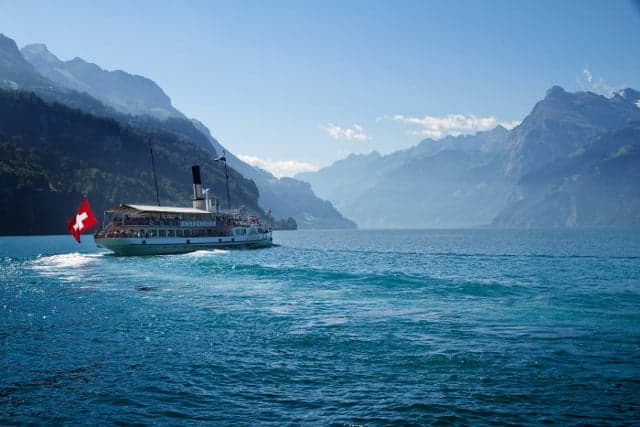Tsunami in Switzerland? New study examines this ‘underestimated danger’

It may be a landlocked country, but Switzerland has some of the biggest lakes in Western Europe, and tsunamis have occurred in Swiss waters the past.
Now researchers want to launch a two-million-franc research project to investigate how likely it is that the country could be struck by a tsunami again, reported the Luzerner Zeitung on Wednesday.
Led by the University of Bern, the Centre for marine environmental sciences in Bremen, ETH Zurich – which includes the Swiss seismology service – and the Swiss environment office, the study will examine the sediments on the bottom of Lake Lucerne over a 22 month period.
They are aiming to place the first probe on the lake floor by the end of the year, with a further eight probes to follow next year.
The data obtained will be fed into a computer simulation giving scientists an idea of how possible a tidal wave is and its potential magnitude.
READ ALSO: Ten stunning Swiss lakes
Speaking to 20 Minuten, Flavio Anselmetti, a geologist at the University of Bern, said the aim was to “quantify this underestimated natural danger”.
Several tsunamis have caused damage and loss of life in Switzerland in the past.
In September 1601 a 5.9 magnitude earthquake hit Unterwalden in the canton of Lucerne, triggering landslides and a four metre high tidal wave on Lake Lucerne that resulted in the deaths of eight people, said 20 Minuten, quoting cantonal archives.
And in the year 563 a huge landslide in the canton of Valais – known as the Tauredunum catastrophe – set off a tsunami on Lake Geneva which destroyed lakeshore villages and killed people and livestock.
Writing in 2012 and quoting researchers at Geneva University, Le Temps said the tidal wave was 13 metres high when it hit Lausanne and eight metres in Geneva.
Speaking to the paper, researcher Stéphanie Girardclos said “the formation of a huge wave on Lake Geneva is possible today. The general public think that lakes are generally calm but that’s not always the case.”
READ ALSO: Earthquakes in Switzerland: how safe are we?
In these cases, the tsunami was triggered by landslides or earthquakes.
Recent events show that both are likely in Switzerland.
In August a huge landslide on the Piz Cengalo devastated the Bondo area of Graubünden.
And earthquakes – albeit small ones – are relatively common.
Large earthquakes – above magnitude six – are expected every 50-150 years. The last, a 6.2, was in Sierre in the canton of Valais in 1946.
Comments
See Also
Now researchers want to launch a two-million-franc research project to investigate how likely it is that the country could be struck by a tsunami again, reported the Luzerner Zeitung on Wednesday.
Led by the University of Bern, the Centre for marine environmental sciences in Bremen, ETH Zurich – which includes the Swiss seismology service – and the Swiss environment office, the study will examine the sediments on the bottom of Lake Lucerne over a 22 month period.
They are aiming to place the first probe on the lake floor by the end of the year, with a further eight probes to follow next year.
The data obtained will be fed into a computer simulation giving scientists an idea of how possible a tidal wave is and its potential magnitude.
READ ALSO: Ten stunning Swiss lakes
Speaking to 20 Minuten, Flavio Anselmetti, a geologist at the University of Bern, said the aim was to “quantify this underestimated natural danger”.
Several tsunamis have caused damage and loss of life in Switzerland in the past.
In September 1601 a 5.9 magnitude earthquake hit Unterwalden in the canton of Lucerne, triggering landslides and a four metre high tidal wave on Lake Lucerne that resulted in the deaths of eight people, said 20 Minuten, quoting cantonal archives.
And in the year 563 a huge landslide in the canton of Valais – known as the Tauredunum catastrophe – set off a tsunami on Lake Geneva which destroyed lakeshore villages and killed people and livestock.
Writing in 2012 and quoting researchers at Geneva University, Le Temps said the tidal wave was 13 metres high when it hit Lausanne and eight metres in Geneva.
Speaking to the paper, researcher Stéphanie Girardclos said “the formation of a huge wave on Lake Geneva is possible today. The general public think that lakes are generally calm but that’s not always the case.”
READ ALSO: Earthquakes in Switzerland: how safe are we?
In these cases, the tsunami was triggered by landslides or earthquakes.
Recent events show that both are likely in Switzerland.
In August a huge landslide on the Piz Cengalo devastated the Bondo area of Graubünden.
And earthquakes – albeit small ones – are relatively common.
Large earthquakes – above magnitude six – are expected every 50-150 years. The last, a 6.2, was in Sierre in the canton of Valais in 1946.
Join the conversation in our comments section below. Share your own views and experience and if you have a question or suggestion for our journalists then email us at [email protected].
Please keep comments civil, constructive and on topic – and make sure to read our terms of use before getting involved.
Please log in here to leave a comment.